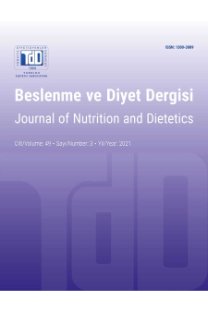Gelişmiş Bazı Ülkelerin Beslenme Politikalarının Değerlendirilmesi
Evaluation of Nutritional Policies of Some Developed Countries
___
- 1.Brug J. The European charter for counteracting obesity: A late but important step towards action. Observations on the WHO-Europe ministerial conference, Istanbul, November 15-17, 2006. Int J Behav Nutr Phys Act 2007;4:11. 2.Food and health in Europe: A new basis for action. WHO, Geneva. Available at: http://www.euro.who. int/__data/assets/pdf_file/0010/98308/e78578.pdf Accessed October 31th, 2012 3.Andersen PP, Cheng F. Introduction and overview. In: Andersen PP, Cheng F, editors. Case studies in food policy for Developing Countries. Volume 1: Policies for Health, Nutrition, Food Consumption, and Poverty. Cornell University Press; 2009. p. 1-4 4.Mannan MA. Food and nutrition policy activities in the USA, Australia, and Norway. J Health Popul Nutr 2004; 22:191-202. 5.Kennedy E. Nutrition policy in the U.S.: 50 years in review. Asia Pac J Clin Nutr 2008;17:340-342. 6.Offut S. Food policy research in the US government. Journal of the Cameroon Academy of Sciences 2008;7:223-228. 7. Rose D. Food stamps, the thrifty food plan, and meal preparation: The importance of the time dimension for US nutrition policy. J Nutr Educ Behav 2007;39:226- 232. 8. Lang T, Rayner G. Food and health strategy in the UK: A policy impact analysis. Polit Q 2003;74:66-75. 9. Lang T, Rayner G, Rayner M, Barling D, Millstone E. Policy councils on food, nutrition and physical activity: The UK as a case study. Public Health Nutr 2005;8:11- 19. 10. Geissler C. Nutrition policies in developing and developed countries. In: Caballero B, Allen L, Prentice A, editors. Encyclopedia of Human Nutrition. Elsevier Academic Press; 2005. p. 293-301. 11. Mazzocchi M, Traill WB. Nutrition, health and economic policies in Europe. Food Economics Acta Agriculturae Scandinavica Section C 2005;2:138-149. 12. Steingrimsdóttir L. Icelandic nutrition policy: Success through compromise. In: Milio N, Helsing E, editors. European Food and Nutrition Policies in Action. WHO Regional Publications, European Series, No. 73; 1998. p. 87-91. 13. Kjaernes U. Food and nutrition policies of Nordic countries: How have they been developed and what evidence substantiates the development of these policies? Proc Nutr Soc 2003;62:563-570. 14. Roos G, Lean M, Anderson A. Dietary interventions in Finland, Norway and Sweden: Nutrition policies and strategies. J Hum Nutr Diet 2002;15:99-110. 15. National Nutrition Council. Finnish nutrition recommendations. Helsinki, 1999. Available at: http:// wwwb.mmm.fi/ravitsemusneuvottelukunta/Nutrec98. pdf Accessed October 31th, 2012 16. Pietinen P, Männistö S, Valsta LM, Sarlio-Lähteenkorva S. Nutrition policy in Finland. Public Health Nutr 2010;13:901-906. 17. Becker W, Lyhne N, Pedersen AN, Aro A, Fogelholm M, Hórsdottir I, et al. Nordic nutrition recommendations 2004 - Integrating nutrition and physical activity. Scand J Nutr 2004;48:178-187. 18. Trübswasser U, Branca F. Nutrition policy is taking shape in Europe. Public Health Nutr 2009;12(3):295- 306. 19. Lachat C, Roberfroid D, Huybregts L, Camp JV, Kolsteren P. Incorporating the catering sector in nutrition policies of WHO European region: Is there a good recipe? Public Health Nutr 2008;12:316-324. 20. Caraher M, Coveney J. Public health nutrition and food policy. Public Health Nutr 2004;7:591-598. 21. Yeatman H. Window of opportunity - positioning food and nutrition policy within a sustainability agenda. Aust N Z J Public Health 2008;32:107-109. 22. Australian Government Department of Health and Ageing. Dietary guidelines for Australians, A guide to healthy eating. Canberra, 2005. Available at: http://www.nhmrc.gov.au/_files_nhmrc/publications/ attachments/n31.pdf?q=publications/synopses/_files/ n31.pdf Accessed October 31th, 2012 23. Mannan MA. On food and nutrition policy activities in the USA, Australia, and Norway. J Health Popul Nutr 2004;22:191-202. 24. Pettigrew S, Pescud M, Donovan RJ. Outcomes of the West Australian school healthy food and drink policy. Nutrition & Dietetics 2012;69:20-25. 25. Pekcan G. Food and nutrition policies: Whats being done in Turkey. Public Health Nutr 2006; 9(1A): 158- 162. 26. Anon. Progress reports. In: Milio N, Helsing E, editors. European Food and Nutrition Policies in Action. WHO Regional Publications, European Series, No. 73; 1998. p. 120-123. 27. Lobstein T. International moves to strengthen food policies. Proc Nutr Soc 2009;68:221-224.
- ISSN: 1300-3089
- Yayın Aralığı: Yılda 3 Sayı
- Başlangıç: 1972
- Yayıncı: Türkiye Diyestisyenler Derneği
Gelişmiş Bazı Ülkelerin Beslenme Politikalarının Değerlendirilmesi
Hafif-Orta Hiperlipidemili Bireylerde Bitkisel Stanol İçeren Yoğurdun Serum Lipid Profiline Etkileri
Zehra BÜYÜKTUNCER DEMİREL, Mehmet FİSUNOĞLU, Gülay GÜVEN SAİN, SERHAT ÜNAL, Tanju H. BESLER
Obezitenin Fetal Programlaması
Üç Nesil Kadınlarda Obezite ile Beden Algı Durumu ve Zayıflamaya Yönelik Uygulamalar
Serap DEMİR, Nilgün KARAAĞAOĞLU
Elif İNAN, Tülin İleri KEÇELİ, Hülya ÖZEL GÖKMEN, Meryem TEKÇİÇEK
Günümüzdeki Moda Diyetlerin Enerji ve Besin Ögeleri Açısından Değerlendirilmesi
FATMA NİŞANCI KILINÇ, Tanju H. BESLER
Kök Hücre Nakli Yapılan Bir Olguda Karşılaşılan Nutrisyonel Sorunlar ve Uygulamalar
Derya BIÇAKLI HOPANCI, Serap AKSOYLAR, Savaş KANSOY
10-15 Yaş Grubu İlköğretim Öğrencilerinde Süt ve Süt Ürünleri Tüketim Alışkanlığı
